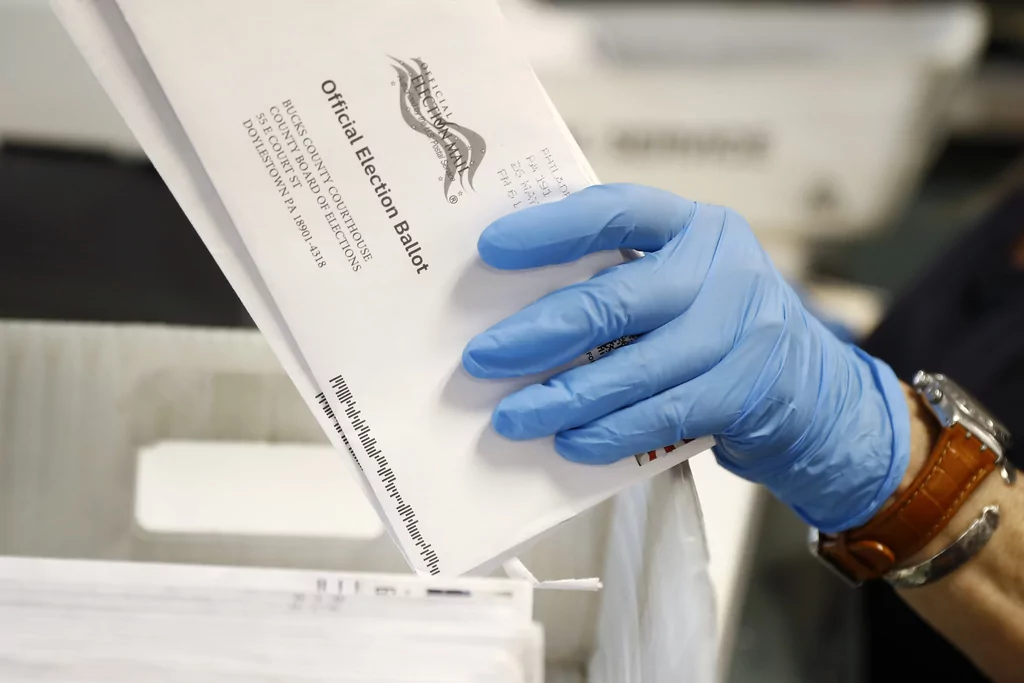

Pennsylvania Democrats asked the Supreme Court on Wednesday to reject Republican efforts to block some provisional ballot options in their must-win battleground state.
The state Democrats, along with two Butler County voters, argued in a court response that the Pennsylvania Supreme Court was correct when it ruled that voters who return faulty mail-in ballots can still vote by casting a provisional ballot on Election Day.
The Republican National Committee and state Republicans disagreed with the ruling and had asked the U.S. Supreme Court in an emergency request this week to block election officials from allowing such provisional ballots.
Attorneys for the Republicans argued the Pennsylvania Supreme Court’s ruling “usurps” the state legislature’s authority. The ruling “effectively creates a cure process for mail-ballot errors — a process everyone agrees the General Assembly has deliberately chosen not to create,” the GOP attorneys wrote.
The high court is expected to respond quickly to the emergency request, and its decision could, according to the Republican attorneys, affect “tens of thousands of votes” in a state that “many anticipate could be decisive in control of the U.S. Senate or even the 2024 Presidential Election.”
Pennsylvania Democrats joined the two original plaintiffs in the case, Faith Genser and Frank Matis. The pair cast defective mail-in ballots in the primary in Butler County and attempted to correct the problems by instead casting provisional ballots, an option election officials told them was available. However, Butler County later rejected their provisional ballots, saying they actually could not cast them since they had already mailed in ballots.
Butler County is among roughly three dozen counties in Pennsylvania that give voters who return defective mail-in ballots, such as those with missing or mismatched signatures, a chance to cure the ballots so that their votes will be counted. Genser’s and Matis’s mail-in ballots were defective because they did not put their ballots in mandatory inner sleeves, called “secrecy envelopes.” Butler County does not offer an option for curing those ballots, which are known as “naked ballots.”
Pennsylvania is unique in that the state legislature explicitly gives individual counties the authority to decide whether or not they want to offer curing options for problematic mail-in ballots.
The state Democrats argued to the high court that requiring all counties to offer provisional ballots to those who have turned in deficient mail-in ballots aligns with state law.
Several other courts have already “concluded that the Election Code requires county boards to count provisional ballots submitted by voters who made disqualifying mistakes on their mail-ballot packets,” the Democrats’ attorneys argued.
Even though curing options are up to individual county election boards, provisional ballot rights are uniform across the state. If voters are told they submitted a mail-in ballot that will not be counted, they have the right to submit a provisional ballot, the Democrats’ attorneys said. They noted that only those who have properly submitted mail-in ballots are barred from casting provisional ballots.
2024 ELECTIONS LIVE UPDATES: LATEST NEWS ON THE TRUMP-HARRIS PRESIDENTIAL RACE
“The equities also weigh decisively against a stay,” the attorneys said. “The extraordinary relief applicants seek would ‘wholly disenfranchise’ voters seeking to cast a provisional ballot ‘for no discernible purpose,’” they wrote.
The filing from Pennsylvania Democrats is part of the second election-related legal fight to make its way to the U.S. Supreme Court this week after the high court also picked up one in Virginia. The justices in that case responded to a petition from the Virginia Republican attorney general within a matter of days, granting his request to continue Virginia’s efforts to keep potential noncitizens off its voter rolls in the face of objections from the Department of Justice.






